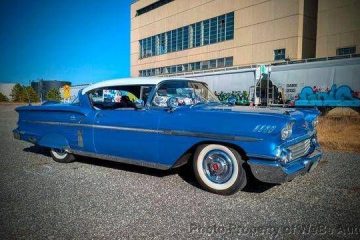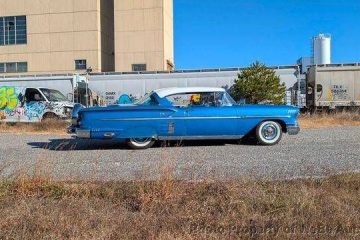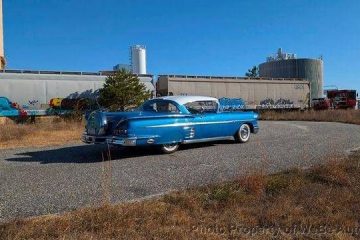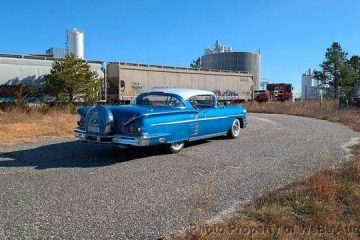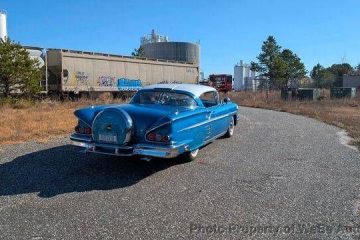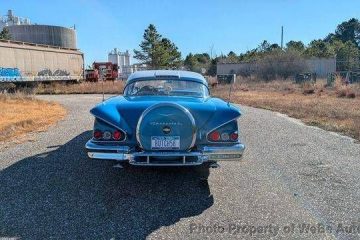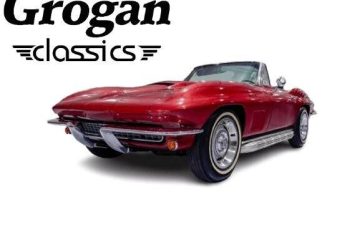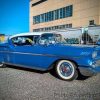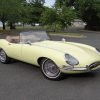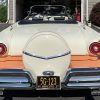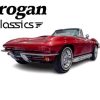1949 Buick Roadmaster Regency Blue Wagon
Description
If you’re under 30 years old, you may not understand why cars like this 1949 Buick Roadmaster estate wagon speak to collectors here in the 21st century. Everyone else, however, remembers spending awesome summer vacations in cars very much like this, travelling the country and seeing why America is great. And if family travelling by highway
much like this, travelling the country and seeing why America is great. And if family travelling by highway was your thing, the Buick Roadmaster woody represented first class accommodations that were unmatched by just about everything else. In short, the Roadmaster was the finest, most luxurious wagon built in America and everyone knew it. Only 653 were built in 1949 and today fewer than 20 are known to exist.
For fans of genuine wood-bodied wagons, the 1949 Buick Roadmaster is the absolute pinnacle of desirability. One-year-only styling is arguably the most successful blend of the dramatic sweep-spear fender lines introduced in 1942 and modernization that would carry Buick into the 1950s. The cowl tag says it came from the factory with code 09 Regency Blue paint, and that’s pretty close to what it’s wearing today. It’s a lovely medium blue that glows in the sunlight and contrasts brilliantly with the restored woodwork that makes this wagon so dramatic. Buick wagons were still farmed out to the Ionia Body Company in Ionia, Michigan, but the integration of wagon bodywork with Fisher steel panels is seamless, creating a sleek profile that looks expensive from any angle. Of note, it appears that the woodwork is mostly original, with a soft golden hue that comes from age, not restoration, although every piece has a glowing layer of varnish to keep it looking its best for years to come. The doors fit well and close with authority (no swollen joints here) and the mammoth hood, which opens from both sides, sits neatly between the fenders. There are a few minor signs of use, most notably some touch-ups along the hood edges where it’s pretty much inevitable, but for casual shows and tours, this Roadmaster is a slam-dunk.
1949 is also notable for the introduction of Buick’s famous portholes in the front fender, and this car proudly wears four of them, denoting the top-of-the-line Roadmaster. All of the chrome and stainless trim on the car has been recently and expensively restored, from the toothy grille to the massive bumpers to the lovely taillights out back. The stainless trim along the flanks has been fully polished and the “bombsight” hood ornament is crisply rendered. The tailgate hardware is virtually irreplaceable, but fortunately the hinges and handles are in excellent condition and you’ll find ornate “Roadmaster” and “Dynaflow” script emblems on the front and rear fenders, respectively. This fully loaded Roadmaster also includes fog lights and a spotlight, although it appears that neither were hooked up following the restoration, but it should be a simple and fun Saturday afternoon project to get them working.
For sheer eyeball appeal, it’s hard to be a red leather interior in a blue station wagon, and this car’s passenger compartment is the pinnacle of late-40s style and elegance. The Roadmaster was the most expensive Buick by a whopping $500 in 1949, so stylists knew that the interior appointments had to justify its premium price. Beautiful mahogany door panels are topped by bright red window garnish moldings that match the dashboard, which was a one-year-only design as well. The leather upholstery remains in excellent condition with almost no signs of wear, even in the driver’s seat, and the rear seat looks completely unused. Plush blue carpets are a luxurious touch that you don’t usually find in utilitarian station wagons, but then again, this is no ordinary wagon; even the cargo bay is expensively finished in matching materials. The driver sits behind a massive steering wheel that makes guiding this big car effortless and gauges are arrayed in round pods, with the speedometer front and center and auxiliary dials on either side. Secondary controls are the chrome pull switches underneath and there’s a Sonomatic AM radio up high in the center of the dash. Of note, neither the clock nor the radio are working, which is pretty typical of cars of this era, but it’s hard to complain about the accommodations otherwise.
Step on the gas pedal and the big 320 cubic inch OHV straight-8 springs to life quickly and easily, immediately settling into an easy idle that sounds muscular but muted. Thanks to extensive recent service work by a noted Buick expert, it drives superbly with big Buick torque available at any speed. It wears correct Buick Turquoise engine enamel and following the war, all large-series Buicks used single 2-barrel carburetors, which is what is on the car today (in this case, a Stromberg unit). The list of new components under the hood is extensive, ranging from the rebuilt carburetor to the voltage regulator to the entire ignition system from coil to plugs. It is not at all fussy and doesn’t seem to get hot or cranky, even when idling on warm days. The wiring harness appears brand new and uses correct cloth-covered leads for an OEM look under the hood and we can find none of the usual “upgrades” that enthusiasts often add to their old cars. Even the original oil bath air cleaner is still in place.
Buick’s Dynaflow automatic transmission is always a source of controversy, but we’ve found that if you know how it operates, it’s quite reliable. There are no shifts, which will feel strange to those of us accustomed to modern automatic transmissions, but you will also find yourself cruising at 60 MPH with no apparent effort, suggesting that the transmission is efficiently doing its thing. This Roadmaster was recently upgraded with a fresh NOS rear end complete with 4.11 gears inside, which makes this big, heavy car feel quite energetic around town, particularly with the Dynaflow. This was obviously a frame-off restoration, as the frame, suspension, torque tube, and other chassis components are in excellent condition and look quite fresh. The brakes have been serviced, the gas tank and exhaust system are brand new, and the floors are beautiful originals that have never been rusty or patched. Correct painted steel wheels with unique 1949 hubcaps and 235/75/15 wide whitewall radials complete the look.
For many wagon enthusiasts, the 1949 Buick Roadmaster is the Holy Grail, a rare find that embodies all that we love about these land yachts. With a quality restoration and enough driving to ensure that it’s properly sorted, this is an excellent example that’s ready to use and enjoy. These rarely come to market, so it’s a genuine honor to have it in our inventory, and we invite you to come see and drive it, because that’s really the best way to appreciate these wonderful machines. Call today!







